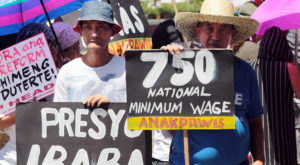The National Federation of Sugar Workers (NFSW) is a farmers’ organization founded in 1971 by Catholic priest Luis Jalandoni, then social action director of the Bacolod diocese, and Italian priest Hector Mauri.
Jalandoni, heir of a wealthy landowning family, is currently senior adviser to the National Democratic Front of the Philippines (NDFP), the umbrella group of the Philippine communist movement.
NFSW’s first president was Ed Tejada, a Catholic student leader.
The group’s initial membership was 30,000.
NFSW’s early organizational success was attributed to the Church’s basic Christian communities (BCC), or grassroots communities, which taught the sugar farmers the importance of united effort in condemning and confronting social injustices.
With the alliance of the Church and union leaders, NFSW focused on the legal rights of farmers and the inequities of land ownership.
Later, NFSW shifted to a more militant posture, Jeffrey Riedinger writes in his book “Agrarian Reform in the Philippines: Democratic Transitions and Redistributive Reform.”
“Stacks of cases of labor code violations were filed by NSFW only to be dismissed by the Department of Labor and Employment,” Riedinger says.
One of NFSW’s main accomplishments is the introduction of the farm-lot system as a response to the sugar crisis in the 1980s.
Under the three-year agreement, about 4,000 hectares of idle land in the Negros provinces would be used by farmers as their own food lots.
NFSW is a member of Unyon ng mga Manggagawa sa Agrikultura (Federation of Agricultural Workers), a national progressive center of unions, federations and organizations of agricultural workers in the Philippines. —Inquirer Research
SOURCES: “AGRARIAN REFORM IN THE PHILIPPINES: DEMOCRATIC TRANSITIONS AND REDISTRIBUTIVE REFORM” BY JEFFREY RIEDINGER, INQUIRER ARCHIVES, UMAPILIPINAS.WORDPRESS.COM


